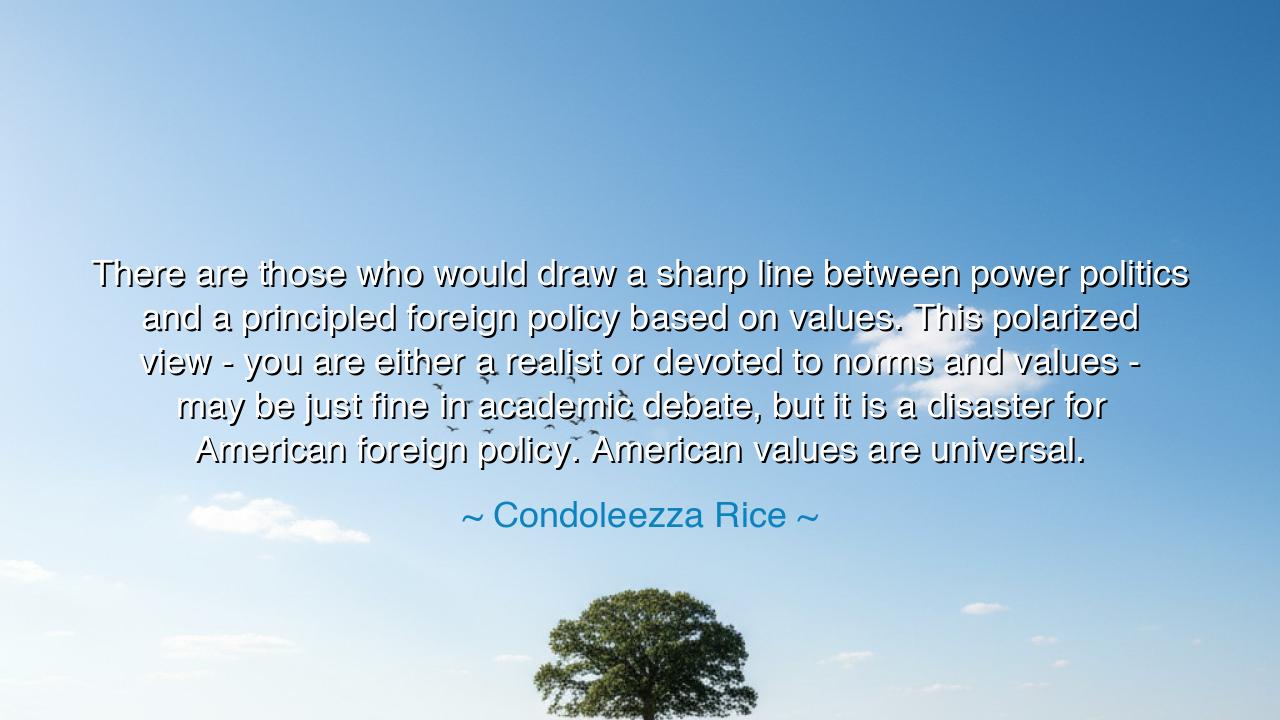
There are those who would draw a sharp line between power
There are those who would draw a sharp line between power politics and a principled foreign policy based on values. This polarized view - you are either a realist or devoted to norms and values - may be just fine in academic debate, but it is a disaster for American foreign policy. American values are universal.






The words of Condoleezza Rice, “There are those who would draw a sharp line between power politics and a principled foreign policy based on values. This polarized view—you are either a realist or devoted to norms and values—may be just fine in academic debate, but it is a disaster for American foreign policy. American values are universal,” speak with the weight of both warning and conviction. She declares that power and principle are not enemies, but companions, and that to sever them is to cripple a nation’s vision. For to govern without values is to wander in brutality, and to govern without realism is to dwell in dreams.
The ancients too knew this balance. They taught that the city-state survived not by the sword alone, nor by philosophy alone, but by the weaving together of both. Athens fell when it trusted too much in glory without prudence; Sparta withered when it clung only to might without vision. Rice echoes this timeless wisdom: that a state must walk with one foot planted in strength and the other in virtue, lest it stumble into ruin.
History gives us vivid witness. Consider the Marshall Plan after World War II. It was born of hard realism—the need to rebuild Europe as a bulwark against chaos and tyranny. Yet it was equally born of values—the belief that human dignity, prosperity, and liberty were treasures worth defending and spreading. By joining power with principle, America helped shape a new world order where freedom could endure. This was not idealism without muscle, nor cold power without conscience, but the fusion of the two.
Rice warns that to divide the world into camps—realists on one side, idealists on the other—is folly. For life does not unfold in abstractions, and foreign policy cannot be forged in the ivory towers of debate alone. Nations live and bleed in the real world, and in that world, it is not enough to be mighty, nor enough to be moral. To endure, a people must be both—wielding power, but guided by universal values that lift their might above mere domination.
Let this teaching endure for generations: do not let false dichotomies blind the eyes of leaders. Power without principle corrupts; principle without power withers. But together they become a force capable of defending freedom, lifting the oppressed, and preserving peace. Thus, as Rice declares, the values of one nation—when rooted in justice—become not parochial treasures, but gifts for all humankind.






DKnguyen dao dang khoa
Domestically, I worry about messaging. A blended doctrine can sound like waffle unless you show receipts. What metrics would make synthesis credible: a consistency index comparing how we treat allies vs. rivals, a human-rights weighting in export licenses, or a yearly ledger of promises versus outcomes? I’d love a proposal for independent oversight that scores policy choices against stated principles. Closed question: should the administration publish an annual “values compliance” report, even when decisions flunk, to build long-term trust through transparency?
TTAnh Tho Tran
Historically, there are moments when strategic interests and moral aims overlap (post-conflict institution-building), and others when they collide (security cooperation with repressive partners). If we reject polarization, what’s the threshold of evidence for believing engagement will nudge a regime toward reform rather than entrench it? Could we require ex-ante benchmarks—media freedom, political prisoner releases—and ex-post audits to continue aid? Open question: when those metrics stall, do you prefer calibrated rollback or decisive rupture, and who bears the short-term humanitarian costs?
NHphung ngoc han
Thinking like a policy designer: in practice, diplomats juggle deterrence, alliances, markets, and human rights. What decision rule blends them without hiding trade-offs? I imagine a traffic-light framework—red lines where values trigger hard constraints (no torture complicity), amber areas with conditional engagement, and green zones where interests and norms align. Which tools best operationalize this—targeted sanctions, arms end-use monitoring, civil society funding paired with security guarantees? Closed question: should governments codify a public weighting of interests vs. principles for predictability?
TLNguyen Thanh Lam
As a reader, I’m sympathetic to rejecting the false choice between raw interest and moral aspiration. Still, I pause at the assertion that one nation’s values apply everywhere. Doesn’t that risk moral overreach or dull our sensitivity to plural traditions? How do you reconcile universal claims with local legitimacy, especially when partners prioritize stability over rights expansion? Closed question: do you believe credibility increases when we admit trade-offs explicitly, or does that candor erode deterrence by signaling we’ll compromise ideals when costs rise?